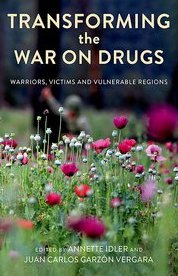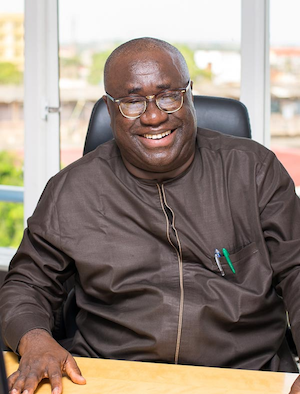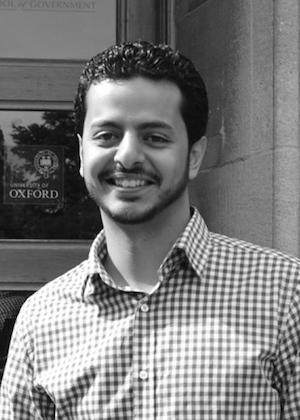Transforming the War on Drugs
Roundtable book launch
Over 50 years since the term 'War on Drugs' was coined after then President of the United States Richard Nixon's speech, has the time come to reassess the merits of conventional anti-drug policies for dealing with the global movement and sale of narcotics? Drawing on global examples from the Golden Crescent (Afghanistan, Pakistan, Iran), the Golden Triangle (Myanmar, Thailand, Laos), Latin America, Russia, and West Africa, Transforming the War on Drugs, edited by Dr Annette Idler and Juan Carlos Garzón Vergara (Oxford University Press 2021), reconsiders the impact of this global struggle upon local contexts, in areas such as human rights, development and public health.
For this special event, Professor Kwesi Aning and Dr Elizabeth Joyce join Dr Annette Idler for a roundtable discussion intended to challenge conventional thinking around the global illicit drugs problem to understand the local impacts of the war. The event will be moderated by Rafat Ali Al-Akhali and will close with a drinks reception.
This event will also be streamed live on our YouTube channel.
 The roundtable is co-sponsored by Oxford Centre for International Studies, Department of Politics & International Relations, the Global Security Programme, Pembroke College and the Oxford Department of International Development.
The roundtable is co-sponsored by Oxford Centre for International Studies, Department of Politics & International Relations, the Global Security Programme, Pembroke College and the Oxford Department of International Development.
 Kwesi Aning is full Professor and Director, Faculty of Academic Affairs and Research (FAAR), Kofi Annan International Peacekeeping Training Centre (KAIPTC) and Visiting Claude Ake Professor at the Nordic Africa Institute and Uppsala University, Sweden. He served as the African Union’s first expert on counterterrorism from 2005-2007. In 2021, served as a senior consultant on the Independent Project Evaluation on Support to the Maldives on Counter-terrorism, and in 2022 appointed as a UN Expert on evaluating the EU’s Counter-terrorism interventions in Sri Lanka. His research interests include peacekeeping economies, hybrid political orders, security sector reform, and stability operations. His most recent publications include:
Kwesi Aning is full Professor and Director, Faculty of Academic Affairs and Research (FAAR), Kofi Annan International Peacekeeping Training Centre (KAIPTC) and Visiting Claude Ake Professor at the Nordic Africa Institute and Uppsala University, Sweden. He served as the African Union’s first expert on counterterrorism from 2005-2007. In 2021, served as a senior consultant on the Independent Project Evaluation on Support to the Maldives on Counter-terrorism, and in 2022 appointed as a UN Expert on evaluating the EU’s Counter-terrorism interventions in Sri Lanka. His research interests include peacekeeping economies, hybrid political orders, security sector reform, and stability operations. His most recent publications include:
 Elizabeth Joyce is Chief of Section in the United Nations Counter-Terrorism Committee Executive Directorate (CTED) at the Security Council, where she supervises work on the Americas and Asia Pacific, including CTED’s dialogue with Member States, assessments of Member States’ counter-terrorism efforts, and the facilitation of technical assistance.
Elizabeth Joyce is Chief of Section in the United Nations Counter-Terrorism Committee Executive Directorate (CTED) at the Security Council, where she supervises work on the Americas and Asia Pacific, including CTED’s dialogue with Member States, assessments of Member States’ counter-terrorism efforts, and the facilitation of technical assistance.
From 2003 to 2013, she was head of the United Nations delegation to the Financial Action Task Force (FATF) and established the UN’s global multi-year initiative with the FATF to improve international standards aimed at protecting non-profit organizations (NPOs) from terrorist financing abuse, with the Governments of Canada and the United Kingdom. From 1999 to 2005, she worked at the United Nations Office on Drugs and Crime (UNODC) in Vienna, Austria, where she managed the Global Programme against Money Laundering, Proceeds of Crime and Terrorist Financing (GPML). She was presiding officer of the Joint Appeals Board from 2002 to 2005 and led the internal justice administration system for the United Nations Office at Vienna. She was formerly head of research and analysis at the Institute for European-Latin American Relations (IRELA) in Madrid, on behalf of the European Union, and editor at the international consultancy Oxford Analytica.
Dr Joyce has undergraduate degrees in English (Bristol) and Law (Manchester School of Law), and an M.Phil in Latin American Studies and a D.Phil in Politics from Oxford University. She has been a Reuters Fellow at the University of Oxford, a Visiting Fellow at the University of Maryland’s Center for International and Security Studies, and a Fulbright Senior Scholar at Georgetown University, Washington D.C.
 Dr Annette Idler is the Director of the Global Security Programme, and Senior Research Associate at the Department of Politics and International Relations, University of Oxford. At Oxford's Blavatnik School of Government she teaches on global security and transnational organised crime.
Dr Annette Idler is the Director of the Global Security Programme, and Senior Research Associate at the Department of Politics and International Relations, University of Oxford. At Oxford's Blavatnik School of Government she teaches on global security and transnational organised crime.
From 2019 to 2021, Dr Idler was Visiting Scholar (2019 – 2021) at the Weatherhead Center for International Affairs, Harvard University, where she was also affiliate at the Weatherhead Research Cluster on Comparative Inequality and Inclusion.
Her work focuses on global security in the contemporary world. She studies evolving security dynamics in the context of armed conflict and the global illicit economy, transitions from war to peace, and state responses to insecurity. She is particularly interested in the political economy of borderlands as spaces where criminal, terrorist, and conflict dynamics converge, and the connections between localized conflicts and insecurities and global shifts in order and power. Dr Idler is Principal Investigator of the Conflict Platform Project and of CONPEACE.
She is the author of Borderland Battles: Violence, Crime, and Governance at the Edges of Colombia’s War (Oxford University Press, 2019), which appeared in Spanish in an expanded version as Fronteras Rojas: Una Mirada al Conflicto y el Crimen desde los Márgenes de Colombia, Ecuador y Venezuela by Penguin Random House (2021), and co-editor of Transforming the War on Drugs: Warriors, Victims, and Vulnerable Regions (Oxford University Press/Hurst Publishers, 2021). Her work has appeared in journals such as World Politics, Third World Quarterly, and the Journal of Global Security Studies.
 Rafat Ali Al-Akhali is a Fellow of Practice – Strategic Projects at the Blavatnik School of Government. From 2017 to 2018, Rafat managed the LSE-Oxford Commission on State Fragility, Growth and Development. From 2018 to 2019, he led the secretariat of Pathways for Prosperity Commission on Technology and Inclusive Development.
Rafat Ali Al-Akhali is a Fellow of Practice – Strategic Projects at the Blavatnik School of Government. From 2017 to 2018, Rafat managed the LSE-Oxford Commission on State Fragility, Growth and Development. From 2018 to 2019, he led the secretariat of Pathways for Prosperity Commission on Technology and Inclusive Development.
Rafat previously served as Minister of Youth and Sports in the Government of Yemen, and prior to that was leading the policy reforms team at the Executive Bureau for Acceleration of Aid Absorption and Support for Policy Reforms. In this position, Rafat led the planning and implementation of key reforms in Yemen including fuel subsidies, power sector, and civil service reforms. He also led business environment reforms and government efforts in private sector development.
Prior to joining the Yemeni government, Rafat worked as a senior consultant and analyst for organisations such as PricewaterhouseCoopers and IBM in Canada. He has also worked in the field of development with a number of international development agencies in Yemen, and was a member of the accessions division at the World Trade Organization (WTO) in Geneva, where he participated in the accession process of several countries, including Yemen.
Rafat earned his second master's degree in public policy (MPP) at the Blavatnik School of Government. His first master's degree was in business administration (MBA) from Ecole des Hautes Etudes Commerciales, Montréal, Canada.